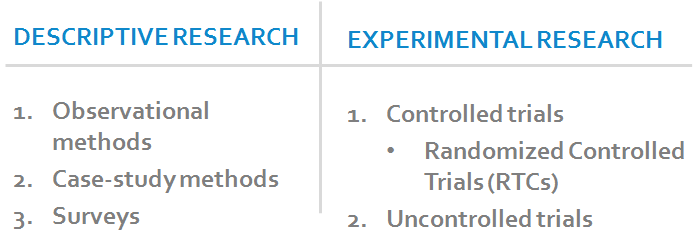2. Types of Research
Medical research can be categorized in various ways. For the benefit of simplification, please find the 4 main ones below:
1. Descriptive research
Descriptive research methods are pretty much as they sound — they describe situations. They do not make accurate predictions, and they do not determine cause and effect.
There are three main types of descriptive methods:
1. Observational methods
3. Survey methods.
2. Experimental research
The purpose of experimental research is exploring cause-effect relationships. In an experimental study, the investigators directly manipulate or assign participants to different interventions or environments, they do not describe a situation.
Experimental studies that involve humans are called clinical trials. They fall into two categories: those with controls, and those without controls.
Randomized Controlled Trials (RTC)
3. Qualitative / Quantitative Research / Mixed methods
4. Reviews
Literature Reviews
Systematic Reviews
Meta-Analyses
Descriptive research methods are pretty much as they sound — they describe situations. They do not make accurate predictions, and they do not determine cause and effect.
There are three main types of descriptive methods:
1. Observational methods
- An observational study is a descriptive study in which the investigator cannot control the assignment of treatment to subjects because the participants or conditions are not being directly assigned by the researcher.
- They examine predetermined treatments, interventions, policies, and their effects.
3. Survey methods.
2. Experimental research
The purpose of experimental research is exploring cause-effect relationships. In an experimental study, the investigators directly manipulate or assign participants to different interventions or environments, they do not describe a situation.
Experimental studies that involve humans are called clinical trials. They fall into two categories: those with controls, and those without controls.
- Controlled trials - studies in which the experimental procedure is compared with another procedure or compared with a control group that doesn’t receive any experimental procedure
- Uncontrolled trials - Procedure is described, but the treatment is not compared with another treatment
Randomized Controlled Trials (RTC)
- The people participating in the trial are randomly allocated to either the group receiving the intervention under investigation or to a group receiving standard intervention (or placebo treatment) as the control.
- Randomization minimizes selection bias and the different comparison groups allow the researchers to determine any effects of the treatment when compared with the no treatment (control) group, while other variables are kept constant.
- The RCT is often considered the gold standard for a clinical trial.
3. Qualitative / Quantitative Research / Mixed methods
- Qualitative research gathers information that is not in numerical form. For example, diary accounts, questionnaires, interviews and observations. Qualitative data is typically descriptive data and as such is harder to analyze than quantitative data.
- Quantitative research: Experiments typically yield quantitative data, as they are concerned with measuring things. Yield data in numerical form which can be put into categories, or in rank order, or measured in units of measurement. Data can be used to construct graphs and tables of raw data. Because numbers are used and not descriptive data, statistical tests can be used for analysis.
- Mixed methods: Research methods, such as observations and questionnaires can produce both quantitative and qualitative information.
4. Reviews
Literature Reviews
- Traditional reviews provide a broad overview of a research topic with no clear methodological approach.
- Information is collected and interpreted non-systematically with subjective summaries of findings.
- Authors aim to describe and discuss the literature from a contextual or theoretical point of view.
- Although the reviews may be conducted by topic experts, due to preconceived ideas or conclusions, they could be subject to bias.
Systematic Reviews
- A document that provides a comprehensive review of all relevant studies (also theses/dissertations, abstracts/conference proceedings, and other grey literature sources) on a particular topic.
- The systematic review is created after reviewing and combining all the information from both published and unpublished studies and then summarizing the findings.
Meta-Analyses
- A subset of systematic reviews;
- Method for systematically combining study data from several selected studies to develop a single conclusion that has greater statistical power.
- Statistically stronger than the analysis of any single study, due to increased numbers of subjects, greater diversity among subjects, or accumulated effects and results.
- If the individual studies utilized randomized controlled trials (RCTs), combining several selected RCT results would be the highest-level of evidence on the evidence hierarchy, followed by systematic reviews (which analyze all available studies on a topic, not statistically, but with mixed data.)
